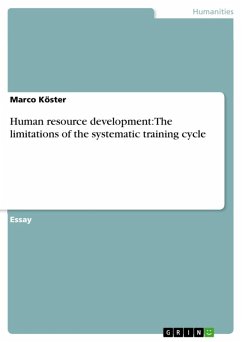Essay from the year 2002 in the subject Sociology - Work, Profession, Education, Organisation, grade: Grade A, University of Manchester (Institute for Development Policy and Management), language: English, abstract: The definition of training provided by Armstrong resembles most definitions of training found in reference works. Training is, accordingly, "the planned and systematic modification of behaviour through learning events, programmes and instruction which enable individuals to achieve the levels of knowledge, skill and competence needed to carry out their work effectively." Two aspects of this definition could be highlighted as the most characteristic and distinctive elements of training as opposed to other methods in the wider field of learning. First, training is planned and systematic; and secondly, it aims at the improvement of defined abilities related to work. The systematic training cycle is a model reflecting these characteristics. It emphasises that training is a continuous process, a circle in which the end leads back to the beginning, rather than a single linear and isolated event with a defined start and finish. In its classical form the systematic training cycle consists of four stages. In the first stage, the training needs on organisational or job level are identified and specified. This needs analysis tries to establish the training gap. The second stage of the systematic training cycle is designing a training programme. The third training cycle stage which mainly consists of the implementation of training. The fourth and last stage of the systematic training cycle is the evaluation of training. The systematic training cycle is a well-structured and internally logical model serving as a theoretical and practical guide for professionals concerned with training. Taylor states, with a touch of irony, that training cycles "must have been created by a superior intelligence, being so neat and logical and all." He indicates that they tend to be simplistic and ignorant towards the complex reality in organisations. In the following, a number of critical variations of the systematic training cycle will be presented. These variations address several shortcomings of the traditional model and suggest improvements on different stages, from pre-assessment considerations at the very beginning of the cycle over needs analysis, training design, plan and implementation to new methods of evaluation.
Dieser Download kann aus rechtlichen Gründen nur mit Rechnungsadresse in A, B, BG, CY, CZ, D, DK, EW, E, FIN, F, GR, HR, H, IRL, I, LT, L, LR, M, NL, PL, P, R, S, SLO, SK ausgeliefert werden.









